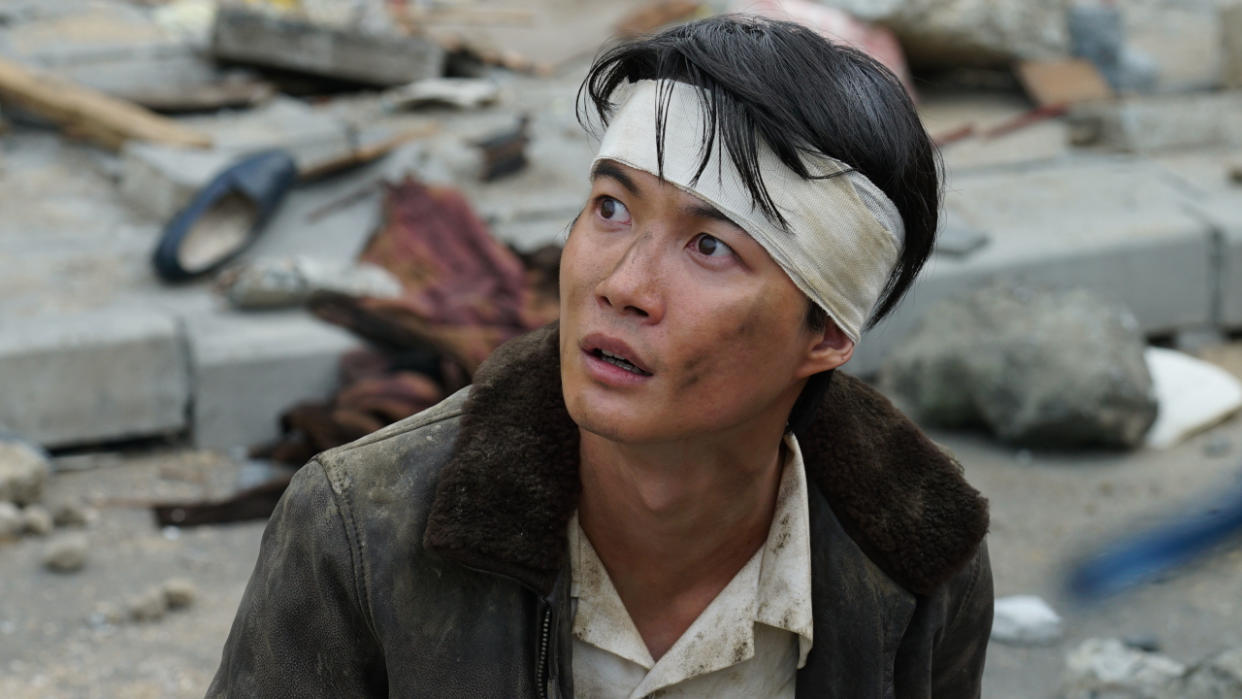The Reasons Godzilla Minus One’s Postwar Setting Was Important For Its Story, According To The Director

- Oops!Something went wrong.Please try again later.
- Oops!Something went wrong.Please try again later.
- Oops!Something went wrong.Please try again later.
Director Ishirō Honda’s 1954 sci-fi movie classic Godzilla was born from a very specific anxiety, as most good fiction is. With the post-atomic age ushering in a new threat of mutual assured destruction, this legendary kaiju represented the bespoke fears of the world in this era of brinkmanship.
In his own way, writer/director Takashi Yamazaki played upon similar fears in his addition to the canon, Godzilla Minus One. To do so, he set the 2023 movie release in a post-World War II Japan that was still a couple years out from realizing those fears in order to explore a different angle of vulnerability.
As I spoke with both Takashi and his Godzilla Minus One star Ryunosuke Kamiki during the film’s press day, we explored various facets of this legendary Toho franchise and its influence. In my research to prepare for speaking with these gentlemen, I found myself mirroring the curiosity of a colleague who suggested digging into why this latest entry in the Godzilla canon was set in immediate post-war Japan. Upon asking Takashi Yamazaki that very question, he shared with CinemaBlend the following reasons:
So I did write it specifically for that time, and yes it does predate the first Godzilla. I wanted the story specifically to be closer, time wise, to that first Godzilla movie. …It’s just a very, very complicated time in history. You have no weapons, you have a lack of government, and when you’re in those circumstances, it’s really these civilians. They are down to their knowledge, their skills, and their bravery. I thought that would make a really, really interesting film.
Falling in line with the lessons Takashi Yamazaki took from Cloverfield, as well as the Godzilla saga on the whole, setting our scene in the immediate aftermath of World War II really heightens the human drama of Godzilla Minus One. It’s reflected in every aspect of the picture, from the backstory for Ryunosuke Kamiki’s Kōichi Shikishima to the actual scale used to depict Godzilla’s attacks throughout the movie.
Vulnerability is key, and the actual historical context gained by setting the story between the years of 1945 and 1947 boosts that point with authenticity. Even in the approach to how and when we see Godzilla Minus One’s titular kaiju is affected by this window in time. We see Kōichi and his community rebuilding towards normalcy after great devastation, with only a handful of actual Godzilla attacks that focus on the more human perspective.
It's thanks to that scale that, much in the spirit of Steven Spielberg's Jaws, the time we spend with the humans never feels wasted. We constantly sense that Godzilla is out there, growing and waiting to return, but friendly conversations over dinner or a rousing push for volunteers to attempt to defeat the creature are not lost in the shuffle. Just like the best Godzilla movies, humanity is well served and not merely treated as clueless kaiju fodder.
At the same time, it cannot be stressed enough how much Mr. Yamazaki honors the spirit of the entire Toho produced canon in Godzilla Minus One. Another point in this interview saw Takashi reveal the Godzilla films that influenced Minus One’s story, which saw very specific films from the classic and modern era also shaping this narrative. It’s a combination of forces that undoubtedly have contributed to the box office success of this new adventure.
Some massive fans of the franchise, like our own Rich Knight, have laid out a case for why Godzilla Minus One is the series’ best entry. There’s even serious talk suggesting the movie deserves a potential 2024 Best Picture nomination, and if I’m totally honest, I can definitely get behind that notion myself.
The finished product of Godzilla Minus One speaks for itself in that context, for sure, and the reaction has made that abundantly clear. At the same time, I hope that you readers will feel the same way I do after gaining more context on how Takashi Yamazaki and Ryunosuke Kamiki approached making it all happen.
Seeing the vast array of influences and the thought process behind why certain decisions were made, it’s even less surprising that Godzilla Minus One turned out the way it did. Takashi’s mixed reaction on making a sequel also best sums up how I feel about the future of Toho’s Godzilla movies, as I’m torn between seeing someone new tell a story they feel deeply about, while also hoping that Mr. Yamazaki will follow up that enticing tease at the end of the movie.
Godzilla Minus One is still tearing up the box office, but you might want to hurry, as its extended theatrical window may not last much longer. Though considering the raves it’s drawing from critics and moviegoers alike, perhaps there’s room for a very jolly holiday with this lizard god of destruction.
Although if you do want to catch one of the movies that inspired Takashi Yamazaki's take on Godzilla, you can currently stream Shin Godzilla on CrunchyRoll. Which, as luck would have it, is available as an add-on to your existing Prime Video subscription!

